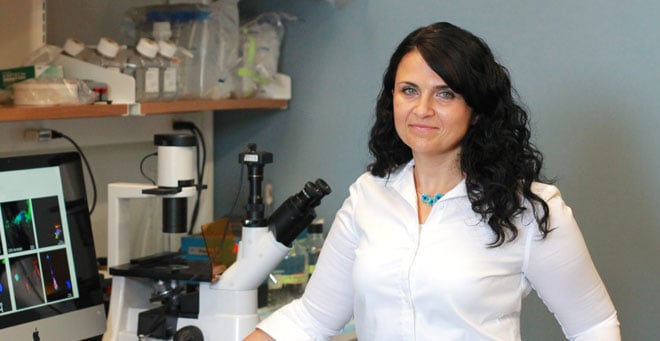 |
|
|
Milka Koupenova-Zamor, PhD |
The American Heart Association has awarded a Scientist Development Grant to Milka Koupenova-Zamor, PhD, instructor in medicine. Dr. Koupenova-Zamor will use the three-year, $231,000 award to better understand how blood platelets may help fight common, widespread viral infections like influenza and how that immune response may have adverse effects that contribute to cardiovascular disease.
Long known to be central to clot formation, platelets have recently been found to also have an immune function during viral infections. Conversely, infections with some viruses have been strongly associated with several cardiovascular disorders involving blood clots, including stroke and heart attack, implicating a role for infection-fighting platelets in those illnesses. Little is known to explain how the interplay between platelets and viruses affect immune response along with heart and vascular health.
“It’s important for me to have a translational component to my basic science work,” said Koupenova-Zamor, who, prior to being promoted to instructor, conducted research as a postdoctoral associate in the laboratory of Jane Freedman, MD, professor of medicine. “This is why the AHA believes in what we are doing. The translational component of our research is to understand how platelets may contribute to cardiovascular disease and infections we see every day in clinic.”
Koupenova-Zamor made the initial discovery that platelets have a role in mouse models’ survival during infection in collaboration with Evelyn Kurt-Jones, PhD, professor of medicine. She will collaborate with Dr. Kurt-Jones and Robert Finberg, MD, chair and professor of medicine, to build on that discovery. Koupenova-Zamor will also receive continuing mentorship from Dr. Freedman.
In addition to continuing to test the interactions of platelets and viruses in highly controlled mouse models, Koupenova-Zamor will analyze human blood samples from patients diagnosed with influenza from a study protocol already established by Dr. Finberg to get a snapshot of virus–platelet interactions in humans. The work will determine how viral infections alter platelets and affect immune response to favor clot formation, possibly leading to obstruction of blood vessels, which can cause strokes and heart attacks.
“I believe that virally activated platelet-neutrophil interactions are crucial for survival but cause clotting risk and thereby are central to stroke,” Koupenova-Zamor wrote in her grant proposal. “The study will greatly expand our limited understanding of the vital cross-talk between the immune and cardiovascular systems, and the contribution of platelets to adverse cardiovascular outcomes during viral infections.”
The American Heart Association created its Scientist Development Grant program to support highly promising beginning scientists in cardiovascular and stroke research between their initial research training and their complete independence. “With my ultimate goal is to have my own lab, this grant gave me the initial path to do original research, to have an impact and to transition from a fellow to a faculty position,” said Koupenova-Zamor. “It’s a great opportunity.”
Reviewers at the American Heart Association lauded Koupenova-Zamor’s demonstrated track record indicating her potential to head her own lab. “This is a highly innovative and very high-impact proposal,” they wrote.